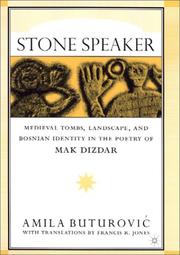| Listing 1 - 4 of 4 |
Sort by
|
Book
Year: 2010 Publisher: Sarajevo : Slavistički komitet BiH,
Abstract | Keywords | Export | Availability | Bookmark
 Loading...
Loading...Choose an application
- Reference Manager
- EndNote
- RefWorks (Direct export to RefWorks)
This book, in a way, engages in a polemic with texts which interpret avantgarde exclusively in the context of a destructive and negatory attitude toward tradition as such. It aims to present Dizdar's best collection of poems as an exceptional, unique example of an avant-garde text, and to discuss Stone Sleeper from a somewhat different angle.As is known, the main task the avant-garde movement took on was to create a kind of art which would correspond with the basic principle of life - the principle of perpetual renewal; the stress avant-garde laid on the written word was informed by a deeply-held conviction that poetry is able to revive lost or forgotten worlds, but also to remember and in this way save worlds from disappearance and death. Stone Sleeper is a magical, lyrical inscenation which fulfils this task by placing trust in, and paying particular attention to the written word. Dizdar's focus on the word, as one of the fundamental principles of avant-garde, is motivated, of course, by the subject matter of Stone Sleeper,its inspirational basis. The stećak1 is Dizdar's fundamental artistic reference.In an attempt aesthetically to express the weight, hardness and substantiality of the stone and the facture of the sepulchral word and letter, Dizdar revives the petrified word of the Bosnian epitaph, masterfully demonstrating how creative potential of poetic language, from which an entire forgotten world emerges, is awakened.Avant-garde is also characterised by the principle of innovation. At first glance, and first glance only, this principle does not fit into Dizdar's aesthetics.For, as has been said in one of the manifestos of the Russian literary avant-garde, "(...) New subjects and objects of creation do not determine its true novelty, and a new light cast on an old world may bring about a most wondrous play." Stone Sleeper is one such spiritual delving into the silent primordium of Dizdar's native land and culture. Instead of progressive movement toward future, amid the roar of time, in Dizdar, just as in Russian acmeists and some futurists (Khlebnikov), we find innovation asa recreation of direct, vivid experience of the world through primordial meanings of the words whose sense had either been petrified by prolonged everyday use and is thus in need of de-petrification, or completely forgotten and needs to be resurrected. Such words in Dizdar's poetry are invested with power, or, as K. Prohić says, with "naturalness of elementary truths and unmediated experience.".

ISBN: 0312239467 Year: 2002 Publisher: Basingstoke : Palgrave,
Abstract | Keywords | Export | Availability | Bookmark
 Loading...
Loading...Choose an application
- Reference Manager
- EndNote
- RefWorks (Direct export to RefWorks)
The poet Mak Dizdar has become a cultural icon in contemporary Bosnia-Herzegovina. Inspired by the lapidary imagery and epitaphs of medieval Bosnian tombstones, his best-acclaimed collection of poetry, Stone Sleeper, reawakens the medieval voices in the historical imagination of contemporary Bosnians. Amila Buturovic looks at Stone Sleeper'srecovery of the ancestral world as an effort to refashion the sentiments of collective belonging. In treating the medieval tombstones as sites of collective memory, Dizdar's poetry evokes new possibilities for Bosnians to cast aside national differences based on religion and embrace a pluralistic identity rooted in the sacred landscape of medieval Bosnia. The book includes a bilingual appendix of Dizdar's poetry with an introduction by the translator, Francis Jones.
Ethnicity in literature. --- Dizdar, Mak --- Dizdar, Mak. --- Criticism and interpretation. --- Bosnia and Hercegovina --- In literature.
Book
ISBN: 9780823231683 Year: 2011 Publisher: New York (N.Y.) : Fordham university press,
Abstract | Keywords | Export | Availability | Bookmark
 Loading...
Loading...Choose an application
- Reference Manager
- EndNote
- RefWorks (Direct export to RefWorks)
Religion in literature. --- Dizdar, Mak --- Criticism and interpretation.

ISBN: 9042015543 9004490221 Year: 2001 Publisher: Amsterdam Rodopi
Abstract | Keywords | Export | Availability | Bookmark
 Loading...
Loading...Choose an application
- Reference Manager
- EndNote
- RefWorks (Direct export to RefWorks)
Comparative literature --- Thematology --- English literature --- History of civilization --- Sociolinguistics --- Ngugi wa Thiong'o --- Walcott, Derek --- Dizdar (mak) --- Hood (hugh) --- Hospital (janet turner), 1942 --- -Maniam (k.s.) --- Narayan (r. k.) --- Religion et litterature --- Sahgal (nayantara) --- Saro-wiwa (ken), 1941-1995 --- Tahir (ibrahim) --- Wiebe (rudy), 1934 --- -Ngugi wa Thiong'o --- -Dizdar (mak) --- -Sociolinguistics
| Listing 1 - 4 of 4 |
Sort by
|

 Search
Search Feedback
Feedback About UniCat
About UniCat  Help
Help News
News